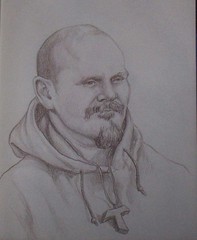Monday, August 28, 2006
Insight from Bishop Spong on Theism
"I've wondered for a while about the definition of theism and its implications. There seem to be three central points you use most often. The God of theism is 1) external, 2) supernatural, 3) intervenes in human lives. Does this statement imply that God is the opposite of these three things?
Much of what you write suggests that this is clearly true of point 3. You present God as not intervening and not capable of intervening. The opposite of point 2 would seem to be that God is natural. Is this a correct assumption and, if so, how do you see God as manifest in the natural world? The opposite of point 1 would seem to be that God is internal.
I'm very aware that I might be reading too much into your words but the sense I get is that you suggest that God is internal to human experience. This seems to fit with some modern brain research that suggests that human beings are "hard-wired" to believe in some higher power and to worship it. This research suggests that belief in God is a natural part of being human rather than a social construct imposed from without.
Is this the non-theistic understanding of God? Internal, natural (thought not manifest outside of human consciousness) and unable to intervene in the world (except perhaps through God's effects on the consciousness of each believer?"
Dear Matthew,
Thank you for your penetrating and perceptive letter that gives me an opportunity to think publicly once more about the meaning of the word "God" in human experience.
Let me begin by making a distinction. I try not to talk about the "God of theism." I regard theism as a human definition of God. It is not who or what God is. Theism is a human attempt to describe a God experience in pre-modern language. Prior to Copernicus, Kepler and Galileo, people inevitably thought of God as a supernatural presence over the natural world.
Before Isaac Newton, they thought of God as setting aside the laws of the universe to do miracles or to answer prayers. Before Darwin and Freud, they thought of God as the external creator and portrayed God as a heavenly parent. Prior to Einstein, they assumed that these perceptions were objectively true and not subject to the relativity in which all human thought dwells since both the time in which we live and the space we occupy are relative, not absolute. So when I dismiss theism, I am not dismissing God. I am dismissing one human image of God that sought to define a human experience of the divine.
To suggest that if theism is not true then the opposite of theism is true is to make the same mistake. Every human attempt to define God is nothing more than a human attempt to define the human experience of the divine. We can never tell who God is or who God is not. We can only tell another of what we believe our experience of God has been. Even then we have to face the possibility that all of our God talk may be delusional.
When I try to talk of God, I am only talking of my God experience. That is not what God is, that is only what I believe my experience of God to be.
I do not experience God as a supernatural power, external to life invading my world in supernatural power. I see no evidence to think this definition is real. The problem is that most people have most deeply identified this definition of God with God that when this definition dies the victim of expanded knowledge, we think that God has died.
I am not trying to form a new definition. I am only trying to share an experience. In my human self-consciousness at both the depth of life and on the edges of consciousness, I believe I encounter a transcendent other. In that encounter, I experience expanded life, the increased ability to love and a new dimension of what it means to be. I call that experience God and that experience leads me to say that if I meet God in expanded life, God becomes for me the source of life. If I meet God in the enhanced ability to love, God becomes for me the source of love. If I meet God in an increased ability to be all that I am, God becomes for me the ground of being.
I can talk about my experience. Having only a human means of communication I cannot really talk about God. Horses can experience a human being entering their horse consciousness, but a horse could never tell another horse what it means to be human. Somehow human beings have never quite embraced that fact that this is also true about the human being's knowledge of God.
I do not know how God acts therefore I can never say how God acts. For me to say God is unable to intervene would be to say more than I know. For me to explain how God intervenes or why God does not intervene is to claim knowledge of God that is not mine.
I test my experience daily in the light of evolving human language. The result of that is that every day I believe in God more deeply, while at the same time, every day I seem to have less and less beliefs about God. Human beings seem almost incapable of embracing mystery, especially ultimate mystery. I am content to walk daily with the mystery of God. I walk past road maps, past religious systems, even my own but never beyond the mystery of God. I suppose that makes me a mystic, but an uncomfortable, never satisfied, always-evolving one.
I find great meaning and great power in this approach. I commend it to you. Thank you for your superb letter.
-- John Shelby Spong
<< Home

